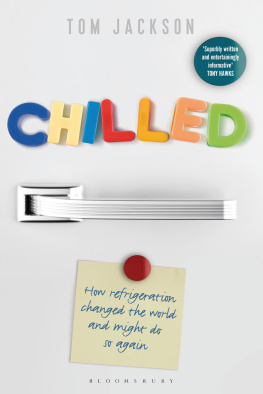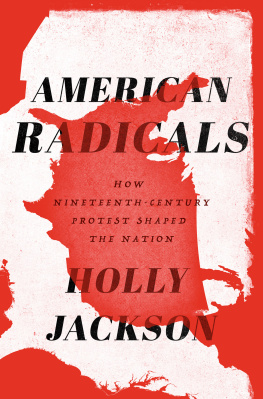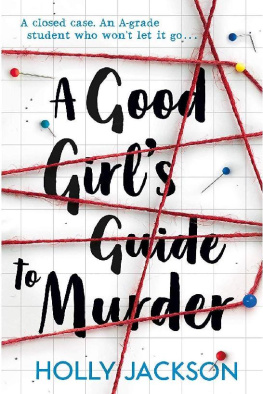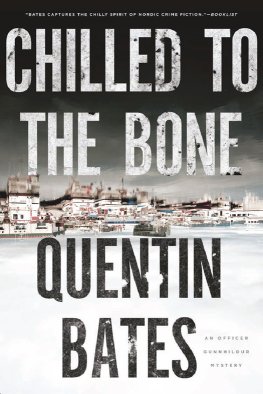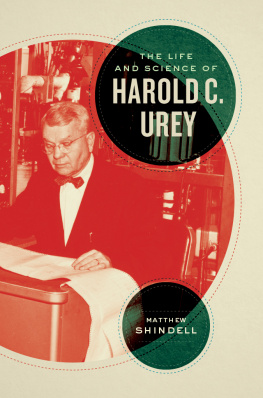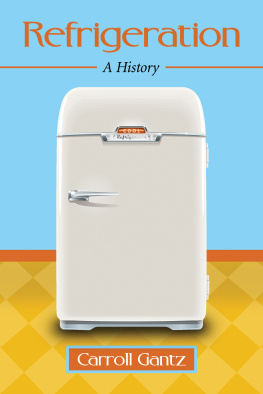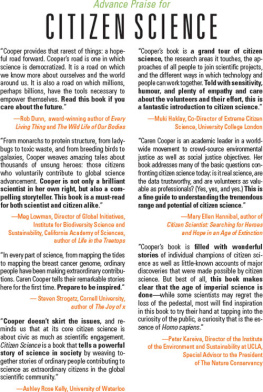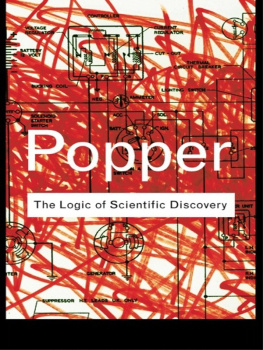CHILLED
Also available in the Bloomsbury Sigma series:
Sex on Earth by Jules Howard
p53 The Gene that Cracked the Cancer Code by Sue Armstrong
Atoms Under the Floorboards by Chris Woodford
Spirals in Time by Helen Scales
For Sarah
CHILLED
How refrigeration changed the world, and might do so again
TOM JACKSON

Contents
THE refrigerator is something of a Boo Radley, the cloistered figure in Harper Lees To Kill a Mockingbird : its normally pale, frequently indoors, seldom thought about much but always there, and in the end (spoiler alert) we need it to make everything all right.
The point is that among the cast of characters that tell the story of refrigeration and its impact on humanity, the refrigerator itself does not have much of a starring role. It just hangs around in the background most of the time, being cool.
Youd be forgiven for thinking that refrigerators, fridges, are nothing to get excited about. They are nothing special. There are hundreds of millions of them. Every household in the developed world has one; a quarter of American homes have at least two. And elsewhere a refrigerator is at the top of the wish list of household appliances just below the television. When we fancy something cold an ice cream, glass of milk, chilled beer there they are in the refrigerator. In this day and age, access to cold is so easy theres no need to think about it.
Nicolas Monardes, a Spaniard writing in 1574 , reports more of a difficulty. Cold was available to him for the right price as ice, but Monardes advises that care should be taken to avoid sources mingled with smelles and evil smokes especially that which passeth by places where are rotten plantes, and naughtie tree, and where dead babies are. All good advice then and good advice now, but thankfully refrigeration has moved on.
The fridge occupies a central place in the lives of the privileged many. To the initiated, life without one would be intolerable. By following just a few simple rules (helpfully spelled out on packets) we can enjoy foods and drinks of pristine freshness whenever we desire them. And when we run out, we simply make a trip to the larger refrigerators at the supermarket to restock.
So ubiquitous is this routine that we dont give it a second thought. We do not consider that our kitchen fridge is the very tip of a chilled tendril, one of millions more that make up a network known in food-industry circles as the cold chain. The cold chain, with its myriad nodes and branches, entangles the globe, creating a temperature-controlled transport corridor that connects the farmers field and the trawlers hold to every grocery store chiller.
Linking to the chain gets us sashimi in Vegas, strawberries at Christmas and sorbets whatever the weather. The chain gives us choice and the luxury of time to make it. No longer is fresh produce rushed into cities during the cool of the night to be consumed within hours of its arrival. Forget the skyscrapers, subways and information superhighways its the fridge that makes a modern city. The refrigerators of Greater Tokyo, the worlds largest urban area, provide the ingredients for at least million meals a day. Without the cold chain, life in such a metropolis would be an unimaginable ordeal.
But the modern world is full of innovations, so whats the big deal about the refrigerator? The kitchen alone is equipped with all kinds of technological necessities the electric kettle, the fan oven, the microwave and the fridge. There is of course one obvious defining difference: all but one of them heats, and only the fridge cools.
Heat and light have been at the command of humanity for at least millennia since we learned to make and control fire. We only really won the battle over cold a century ago, and still the spoils of that victory have yet to be shared with many parts of the globe. Today, the idea that hot and cold are two sides of the same coin seems second nature, but that was far from obvious to the long line of scholars whose combined efforts figured it out for us. Their stories run from the inspired to the bizarre, as they employed gnomes, meteors, perpetual motion machines and tortured mice to reveal the truth.
The knowledge that they the likes of Cornelius Drebbel, Robert Boyle and James Joule revealed was to form the basis of thermodynamics, the field of physics that tackles the behaviour of energy. Martin Goldstein, an American chemist and author on the subject of thermodynamics, had it right when he wrote: Some people want to know how a refrigerator works. Others want to know the fate of the universe The science that relates them is thermodynamics.
A refrigerator is a heat pump, which on the face of it is perhaps an uninspiring term. However, dig a little deeper into the concept and it reveals something rather amazing tiny acts of rebellion against the conformity of the universe.
The idea of a heat sink is perhaps a familiar one. Basically it means that the energy of a hot space is transferred to one that is less hot. So heat pours out of the Sun, warming objects around it mostly the planets, including Earth. In turn Earths heat energy dissipates into the growing emptiness of space, which is the ultimate heat sink. This one-way travel is an unbreakable law of thermodynamics, but one that can be disrupted, albeit temporarily, by a heat pump. A heat pump can push heat against the universal flow. In the case of a refrigerator, it is pushing heat out of the food and freezer compartments into the surroundings, and as a result everything inside gets colder.
Our planet alone, among the billions postulated to exist, is home to an army of heat pumps, machines that are working against the inexorable collapse of order into chaos. Now it is perhaps becoming clearer why palaeolithic man had little trouble torching a wooden stick, but had to wait several dozen millennia before he could put an ice-lolly on it.
The technology that could harness physical laws to create cold was far from an overnight sensation. It took years to transform it from a prototype in 1750 to anything approaching a mass-market product. However, the demand for cold had raced ahead of the technology.
The storage of natural ice had been a niche practice for the wealthiest since antiquity, especially in Asia. As with so many other technologies, Eastern know-how was put to work in Renaissance Europe, so the nobility of Italy, France and Spain also had the luxury of chilled wines and iced desserts. Luxury was not all it was used for. In 1503 , Cesare Borgia, the notorious leader of an army that had swept across swathes of southern Europe in the name of the Pope Cesare was a bastard son of the incumbent used his supply of ice for a less traditional purpose.
Cesare had already made his mark on history by that time. He is reputed to be the inspiration behind Niccol Machiavellis The Prince ( 1513 ), a handy guide on how to rule with terror and treachery, and he also appears as one of the bad guys in the Assassins Creed games. Neither makes reference to his possibly unique experience with ice. Both he and his father, Pope Alexander VI, were struck down by a terrible fever retold as a planned poisoning gone awry. While the Pope opted for a thorough-going bleeding to combat the malady, Cesares fever raged so strongly that he was immersed in a man-sized oil jar filled with iced water. It did the trick; Cesare survived to lie, cheat and murder for another years but the treatment is reported to have made all of his skin fall off (Pope Alexander died, and his body was so swollen by the disease that it had to be literally hammered into the coffin).
The medicinal virtues of cold were widely considered although drinking too much cold water was also deemed a dangerous and unnatural act but preservation of food was not regarded as a primary use for ice at first. The rise of icehouses across Europe was primarily due to a demand for chilled wines and dessert but the vogue grew for stocking them with sides of fresh meat and ripening fruits.
Next page
